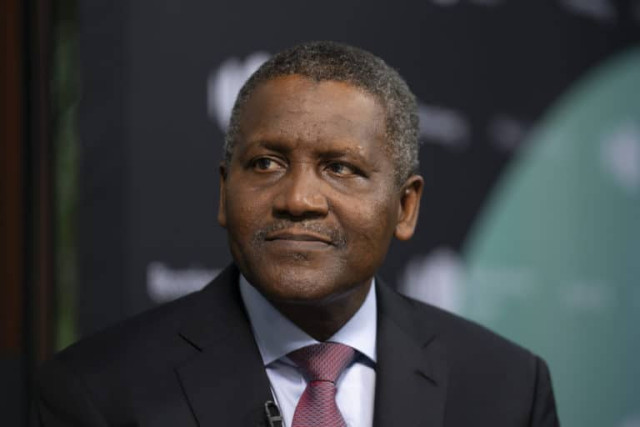President of the Dangote Group, Alhaji Aliko Dangote, has revealed intentions to lower the cost of Liquefied Petroleum Gas (LPG), commonly referred to as cooking gas.
He has also indicated plans to sell the product directly to consumers if current distributors do not facilitate a price reduction.
However, industry players have opposed this initiative, claiming that Dangote seeks to dominate the LPG market, voicing their concerns on Monday about the potential for a monopoly.
During a recent visit to his refinery by various local and international guests, Dangote highlighted that the current pricing of cooking gas is high and unaffordable for many, who rely on firewood for cooking.
He mentioned that the refinery now produces 22,000 tonnes of LPG daily and is increasing production to meet Nigerian demands, especially as more people are transitioning to gas for cooking.
Speaking to members of the Lagos Business School CGEO Africa at the refinery in Lekki, he stated, "We currently produce about 2,000 tonnes of LPG per day. Nigeria is gradually shifting towards the use of LPG.
I believe it is costly, but we are making efforts to lower the price." Dangote warned that if distributors do not lower prices, he would sell directly to consumers, encouraging a shift from firewood and kerosene to LPG.
Recall that Dangote plans to begin direct distribution of petrol, diesel, and aviation fuel to marketers nationwide in August, supported by 4,000 CNG-powered buses. At present, cooking gas prices range from N1,000 to N1,300 per kilogramme, which Dangote aims to reduce for better affordability.
Industry operators have expressed dissatisfaction with Dangote's proposal to alter the market dynamics.
In an interview, Godwin Okoduwa, former Chairman of the LPG and Natural Gas Downstream Group of the Lagos Chamber of Commerce and Industry, described the proposal as monopolistic. Okoduwa emphasized the need for Dangote to acknowledge the efforts of previous investors who grew the market from 70,000 metric tonnes in 2007 to over 1 million metric tonnes in 2022, advocating for collaboration rather than monopolization.
He noted, "I regard it as monopolistic. Protecting the market is essential for fostering growth.
The LPG sector in Nigeria has expanded significantly through collaboration—with the Federal Government, NLNG, and other stakeholders. This development is a product of cooperative efforts.”
He added that the industry should focus on increasing LPG consumption, which currently averages less than 6kg per capita, highlighting that other countries are achieving much higher figures.
Okoduwa urged to avoid undermining industry players who have invested resources and efforts in this sector.
“There are those who have dedicated finances and efforts, while others merely come to benefit from the foundations laid by others. I am confident that Dangote would not have invested without an existing market; therefore, he must respect the current industry players and allow for growth through a collaborative approach rather than a zero-sum mindset.”
He advised Dangote that there is potential for market expansion—the Nigerian LPG market could reach 5 million tonnes. “Collaboration, not competition, is key. Ultimately, all parties will gain,” he stated.
When informed that Dangote's main goal is to make cooking gas accessible and encourage a shift from firewood, Okoduwa responded, “He should focus on developing LPG infrastructure in the Northeast, where usage is minimal. That would indeed be appreciated.”
Similarly, Bassey Essien, Executive Secretary/CEO of the Nigerian Association of Liquefied Petroleum Gas Marketers, expressed skepticism about the feasibility of Dangote selling directly to consumers or drastically reducing prices.
“This idea seems unrealistic. What about petrol? Has the refinery managed to sell petrol directly to consumers at a lower price?” Essien questioned.




















